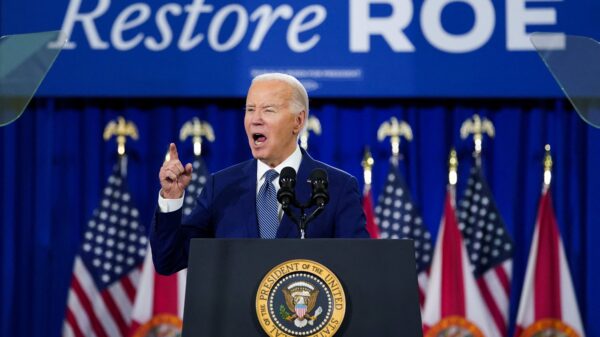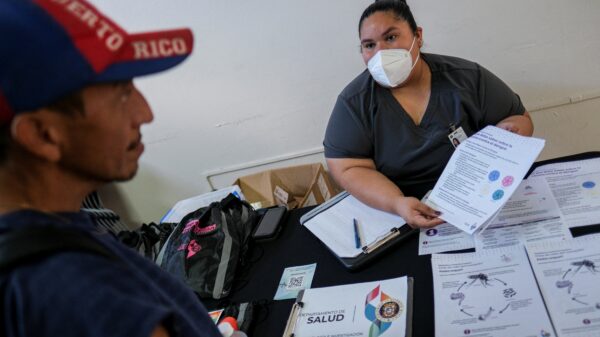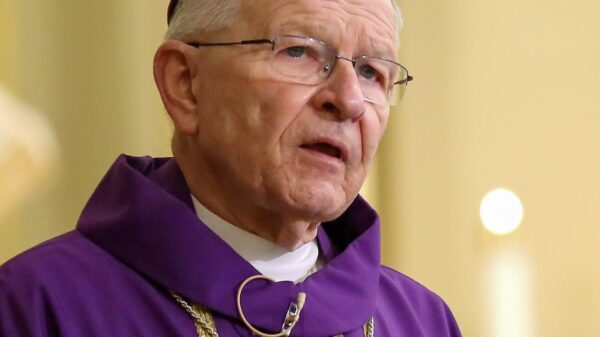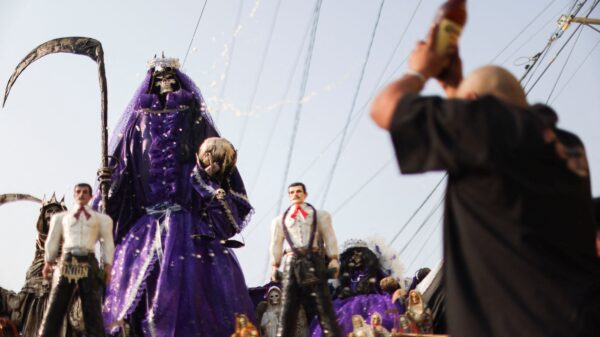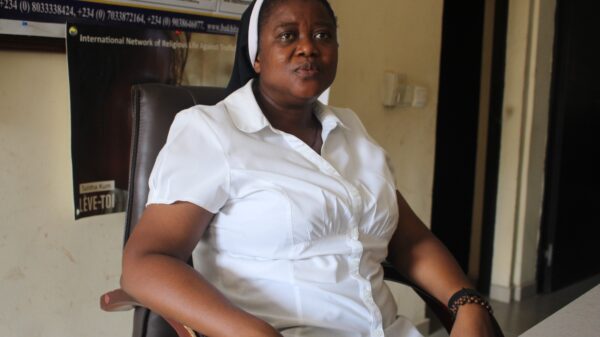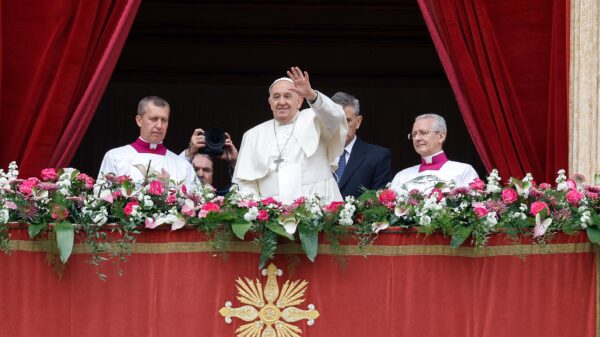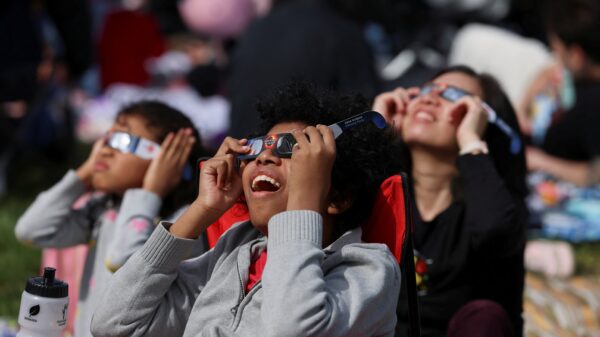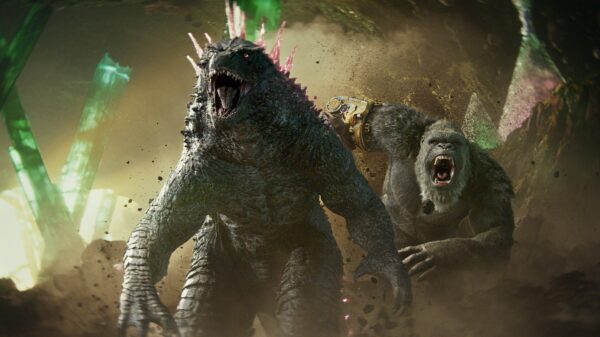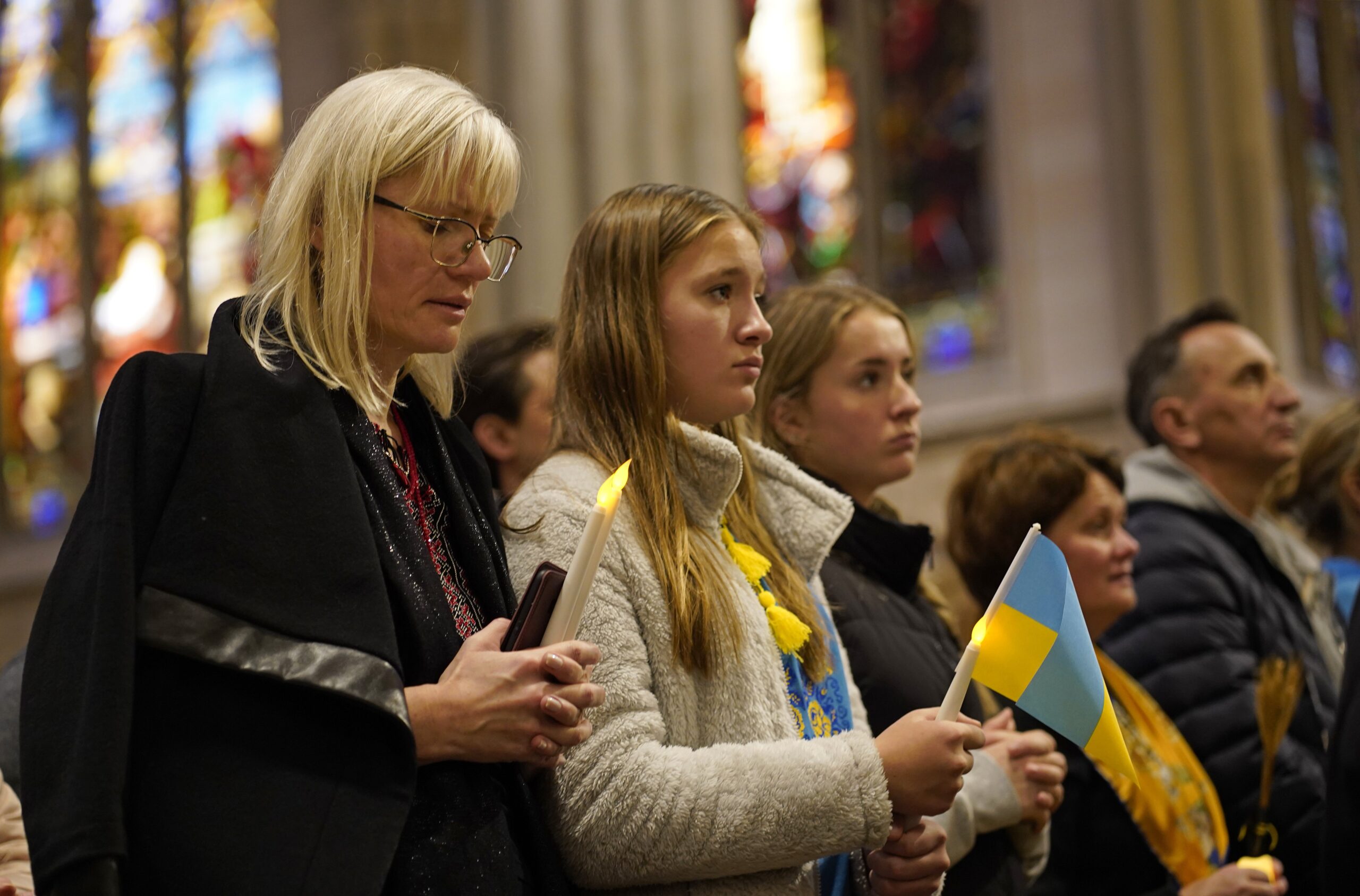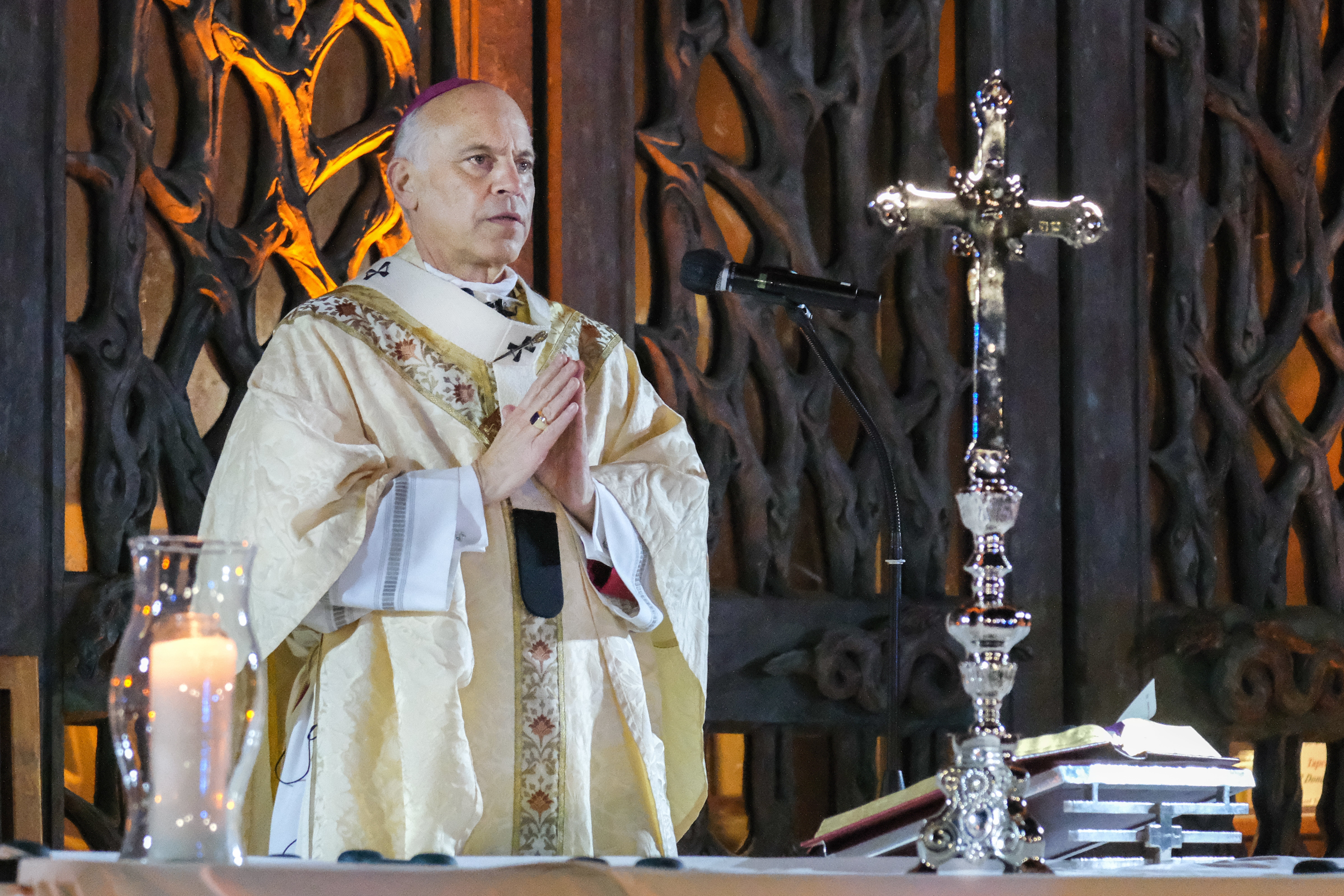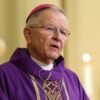NEW YORK (OSV News) — As hundreds gathered to commemorate a Soviet-era genocide against Ukrainians, “our hearts, our hope, our prayer” will conquer the hatred and violence that fuel war, said Metropolitan Archbishop Borys A. Gudziak of the Ukrainian Catholic Archeparchy of Philadelphia.
The archbishop led a final benediction concluding a Nov. 18 ecumenical prayer service held at St. Patrick Cathedral in New York City to mark the 90th anniversary of the Holodomor, an artificial famine in Ukraine engineered by Soviet Union leader Josef Stalin between 1932-1933.
The annual commemoration, held for more than 30 years, was organized by the Ukrainian American Congress Committee of America.
Named for the Ukrainian words signifying “hunger” and “death,” Stalin’s famine claimed approximately 7 million to 10 million Ukrainian lives in tandem with a brutal Soviet policy of collectivization, theft, terror and abuse that sought to erase Ukrainian cultural and political identity.
Cardinal Timothy M. Dolan of the Latin Archdiocese of New York welcomed those on hand at the service, many of whom had arrived after taking part in a solemn procession from St. George Ukrainian Catholic Church in New York’s East Village neighborhood, with several dressed in traditional Ukrainian attire and carrying stalks of wheat, emblematic of the Holodomor.
Among the dignitaries in attendance at the cathedral were Metropolitan Antony and Archbishop Daniel of the Ukrainian Orthodox Church of the U.S.A., Ukraine Ambassador to the U.S. Oksana Markarova, Ukraine Ambassador to the United Nations Sergiy Kyslytsya, U.S. Senate Majority Leader Chuck Schumer and Ambassador Elisabeth Millard, acting representative of the U.S. to the U.N. Economic and Social Council.
The Ukrainian Chorus Dumka of New York provided music for the gathering, including a rendition of Mykola Lysenko’s “Prayer for Ukraine,” a spiritual anthem of that nation long performed as a closing hymn at Ukrainian Greek Catholic and Orthodox Church of Ukraine liturgies.
Seated in the front row at the service were two Holodomor survivors, Nadia Severyn and Ukrainian Orthodox Father Yuriy Bazylevsky.
“They have big hearts. They lived with hope,” said Archbishop Gudziak during his benediction. “They have overcome incredible brutality (and) and bloodshed to give life, and through their presence, to give us hope.”
In his opening remarks, Cardinal Dolan described the “magnificent Ukrainian people” as “experts in suffering.”
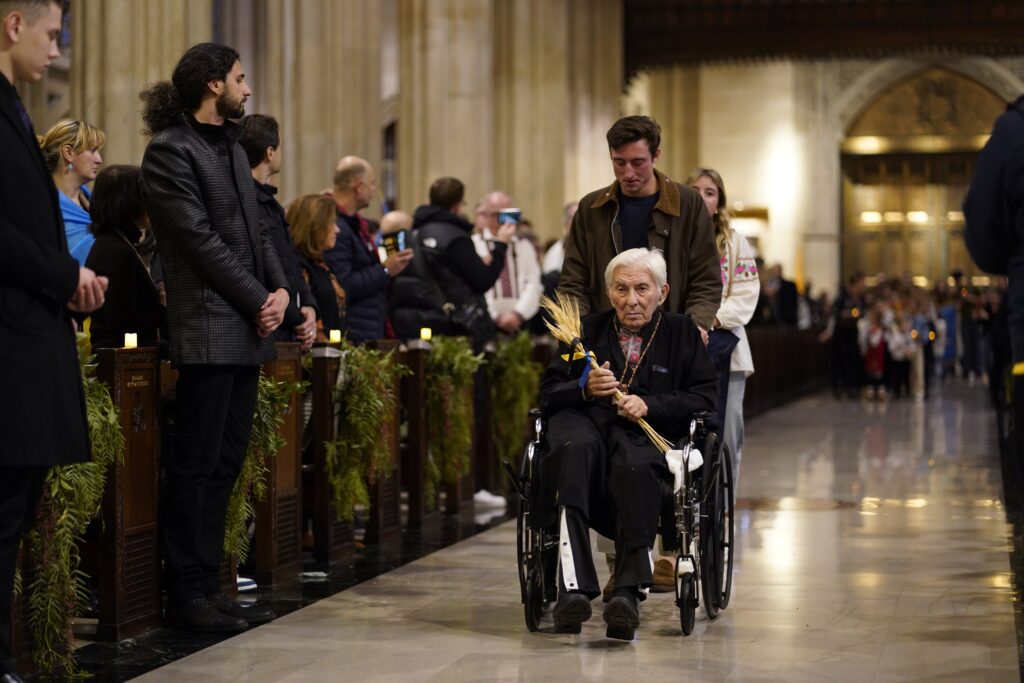
Russian aggression against Ukrainians has spanned centuries under tsarist, Soviet and post-communist regimes, including that of current Russian President Vladimir Putin.
Since launching its full-scale invasion of Ukraine in February 2022 — which continues attacks begun in 2014 that killed and injured thousands — Russia has killed more than 9,701 Ukrainian civilians (including 510 children); injured some 17,748; held 19,600 children in Russian “re-education” camps; forcibly transferred 2.5 million Ukrainians from southern and eastern Ukraine to the Russian Federation; and committed close to 113,138 documented war crimes, according to Ukraine’s government.
Currently, there are an estimated 5.1 million individuals internally displaced within Ukraine, according to the International Organization for Migration, part of the United Nations network. More than 6.2 million Ukrainians have sought safety abroad since the start of the full-scale invasion.
Some 30 countries, as well as the European Parliament and the Parliamentary Assembly of the Council of Europe, have declared the 1932-1933 Holodomor a genocide. In a Nov. 24, 2022, letter to the Ukrainian people, Pope Francis recalled the “terrible genocide of the Holodomor.”
Markarova noted that “more than 30” U.S. states have “already recognized the Holodomor as genocide,” with New York becoming the 34th to do so shortly before the prayer service.
Kyslytsya said that 45 U.N. member states, including the U.S., have signed on to Ukraine’s declaration on the 90th anniversary of the Holodomor.
In 2018, the U.S. Congress recognized the Holodomor as a genocide.
Russia’s latest attacks on Ukraine’s grain harvests, upon which numerous nations are dependent, have evoked again the Holodomor.
Having walked away from the Black Sea Grain Initiative, which enabled Ukrainian grain shipments to continue amid the war, Russia has continued to relentlessly target Ukraine’s ports, while ravaging Ukraine’s fertile soil through extensive mining and through the destruction of the Nova Kakhovka dam.
In a report released Nov. 16, The Hague-based Global Rights Compliance — an international human rights law foundation — found Russia had systematically planned prior to its full-scale invasion of Ukraine to pillage over $1 billion of Ukrainian grain per year. The report will form a forthcoming dossier of starvation war crimes that will be submitted to the International Criminal Court.
“We are again faced with starvation, suffering and horror for not only Ukraine but nations throughout the world,” said Metropolitan Antony in his reflection.
Amid such horrors, Ukrainians offer the world a “radiant example” of “perseverance and hope,” said Cardinal Dolan.
He stressed the importance of the commemoration, saying that “remembrance is so important that Jesus … the night before he died on the cross” instituted the Eucharist, asking his disciples to “do this in remembrance of me.”
“The last word of our prayer today is a word of hope,” said Archbishop Gudziak. “And so we pray our hearts, with great hope and a trust that … humanity, created in God’s image and likeness, will overcome the hate — in Ukraine, among terrorists, killing in the Holy Land, the death of Muslims in China … antisemitism, Islamophobia. It will overcome the hatred of Putin. That is our prayer today.”
Gina Christian is a national reporter for OSV News. Follow her on X, formerly Twitter, at @GinaJesseReina.


